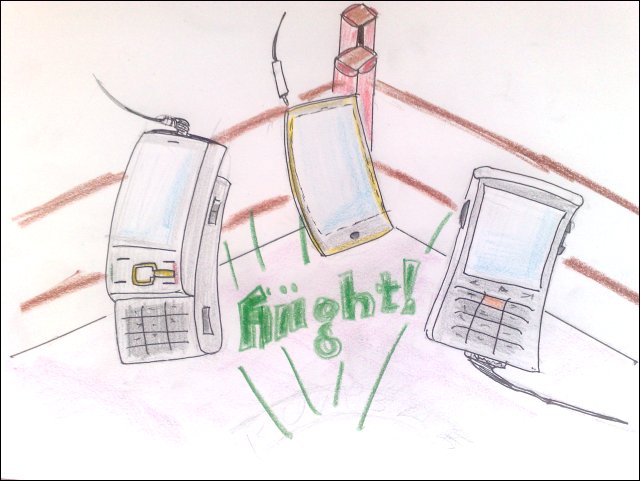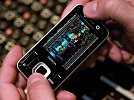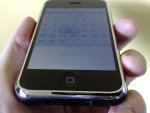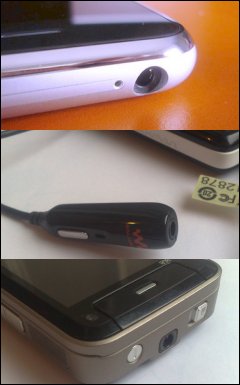Last year at this time, the then current MP3 phones underwent an audio comparison test by my good self. Now the Nokia N91, W950 and iPod Shuffle have been superseded, it’s time to return to the land of music and call forth the latest contenders.

The Contenders
 Frrroooooom the north we have the Fighting Finn, the White and Blue Corner, the Nokia N81 8GB! Our only ‘slider’ phone, with the only sensible headphone socket (a nice and central 3.5mm) and some always available playback controls, can it pull ahead of the competition?
Frrroooooom the north we have the Fighting Finn, the White and Blue Corner, the Nokia N81 8GB! Our only ‘slider’ phone, with the only sensible headphone socket (a nice and central 3.5mm) and some always available playback controls, can it pull ahead of the competition?
![]() Iiiiinnnn the Orange and Black Corner, Sony Ericsson’s W960 Walkman phone – also sporting 8GB, comes up to the plate. The lack of a 3.5mm headphone jack is an interesting decision, but the supplied extension cable with socket on the end (and one button remote control) still allows you to use your own headphones if you want. Dedicated playback buttons are available while the Walkman app is active, and the side rocker controls the volume and forward/back skipping if you hold them down (and don’t look for that in the manual - I couldn’t find it either).
Iiiiinnnn the Orange and Black Corner, Sony Ericsson’s W960 Walkman phone – also sporting 8GB, comes up to the plate. The lack of a 3.5mm headphone jack is an interesting decision, but the supplied extension cable with socket on the end (and one button remote control) still allows you to use your own headphones if you want. Dedicated playback buttons are available while the Walkman app is active, and the side rocker controls the volume and forward/back skipping if you hold them down (and don’t look for that in the manual - I couldn’t find it either).
 Aaaaaaand finally! The challenger from Cupertino, the Apple iPhone. Also available with 8GB of flash memory, it does take your own headphones but you’ll need to hand over a bit more cash for a special adaptor to lift the 3.5mm headphone socket up from deep inside the machine to somewhere where you can use your own.
Aaaaaaand finally! The challenger from Cupertino, the Apple iPhone. Also available with 8GB of flash memory, it does take your own headphones but you’ll need to hand over a bit more cash for a special adaptor to lift the 3.5mm headphone socket up from deep inside the machine to somewhere where you can use your own.
Ringside Seats
The aim of this article is to listen and review the music, not the ancillary functions, or even how good the bundled headphones are – all three devices allow you to use your own headphones, either natively like the N81, or through an extra cable or adaptor. So I’m going to use the best pair of headphones I have – a set of Ultimate Ears 11’s which are custom moulded to my ears and carry a stupid number of audio drivers inside them. Any flaws in the cans will be consistent, but the majority of audio problems are going to be as a result of the handsets.
The Challenge
Three musical tracks were chosen for the audio test:
AC/DC’s Whole Lotta Rosie, for sheer musical power, driving bass lines and vocal reproduction. This is classic rock and roll, and if the smartphones can cope with this, then the pretenders in today's popular beat combos will be easy.
Yoko Kano and the Seatbelts performance of Tank! (the theme to Cowboy Bebop) – it’s a big band bebop jazz ensemble of crashing noise, conflicting beats and consistently remains interesting throughout the track. Perfect to push the ability to pick out single instruments and tones from a crowd.
Finally I have a performance of Mars – The Bringer of War, Gustaf Holtz' orchestral peace. Very brooding and menacing, with massive changes in volume, for quiet approaching menace to bombastic destruction. It’s great for working on a range of loudness levels and clarity.
 How They All Measure Up
How They All Measure Up
As both Steve and I pointed out in last year's audio test, the limiting factor in music on smartphones is no longer the technology – circuitry, storage memory, power requirements and connectors are now all at a price where there should be no reason not to ensure that any smartphone is a dedicated music player. Where the changes are going to be in the future, and what mark out devices, are going to be in the interface (both hardware and software); areas we’ve already discussed in the reviews of the N81 and W960.
Yes there are subtle differences in the audio quality that I could pick up – I was planning to leave all the devices at their default sound settings, with no tweaking on the graphic equalisers, but the honest answer is that while these ‘default’ profiles do vary from device to device, by applying the equalizer I could get a sound out of each device that was noticeably similar. On defaults, the N81 sounds a little bit duller – I think due to emphasising all the frequencies to a similar level. The W960 on the other hand puts a lot more emphasis on the higher and lower frequencies, and of course has the extra oomph in the bass department with the graphic equaliser having the trademark “Megabass” system.
One area where I did pick up a difference was in stereo separation – it was much easier on the iPhone to pick out the stereo separation – sounds were more to the left or more to the right than on the other devices.
Noticeable on all three devices is the amount of ‘hiss’ they produce. Battery power usage is kept to a minimum by only switching on what’s needed, when it’s needed in most consumer devices. So if the music player is not on, then there is no current passed through the audio circuits. Warm up the application, and you get a tiny amount of background noise – hiss.
Each of the three devices has this hiss, and to a noticeable (although not deafening) effect when nothing is playing. This is one area where I would put the W960 ahead – it has the least hiss of any of the devices, with the iPhone coming in next, and the N81 being the loudest – although this should be tempered with the fact the N81 will wait until you hit ‘play’ to warm up the circuitry, while the other two devices do so as the music app becomes active.
Volume is always a tricky one – these devices are used mainly in urban environments and people are looking for maximum volume. And in part this is scuppered by the European Union putting volume limits on the decibel output of any media device. To be honest I went into this test thinking that each device was going to have the same upper (legal) limit, but this wasn’t the case. Nokia’s N81 was the earwax loosening loudest, although the limits of the Mp3 codec were pushed and it was very slightly distorted, but not enough to have a major impact on the music. Next was the iPhone which was just a shade into the painful loudness and finally the W960 stayed the right side of ouch but perhaps would struggle on the London Underground.
And I have to stress that all these differences are very slight – I was focussing heavily to pick up on them. Switching back to basic (cheap) headphones and the quality differences were markedly less noticeable, to the point where I would struggle to tell the devices apart (once the equalizers were set to my favourite tonal quality).
Music based smartphones have audibly come of age – the decision between a dedicated player and a converged device has nothing to do with the quality. Choose on looks, choose on buttons, choose on no-buttons, choose on storage, but you won’t be able to choose on sound quality. They’re all the same high standard.
-- Ewan Spence, Feb 2008
